Clairecords
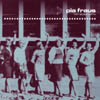 I really do sincerely hate name-dropping in music reviews, however,it's impossible to get around this one, like a dead animal on thesidewalk you simply can't ignore and have to step over. To theircredit, this Estonian group has come closer than anyone in making analbum sound just like 1990's 'Loveless' by My Bloody Valentine fortheir second full-lengther, and it's hardly surprising that the labelto release this mentions Slowdive in over half of their band's webpages on their site. It's so strikingly similar from the pretty fuzz,through the male and female soft vocals, down to the usage of a burieddrum machine on the final cuts. Give them a break, however, as eachmember was only 9 years old in 1990, therefore the chances of them everseeing a band live who has had such an apparently profound influence onthem are quite slim. The band sounds amazingly direct and sincere,however, and the tunes are indeed catchy and full of proverbialdistorted guitar, in a mesmerising fuzz like the glaze covering youreyes on a hot, cloudy, yet rainless day. Much like a number of releaseson Claire, songs can easily be picked apart and stand strong on theirown amidst an ocean of variety but a collection of ten of these in arow with so much in common can be only be, at worst, slightlycumbersome to wade through.
I really do sincerely hate name-dropping in music reviews, however,it's impossible to get around this one, like a dead animal on thesidewalk you simply can't ignore and have to step over. To theircredit, this Estonian group has come closer than anyone in making analbum sound just like 1990's 'Loveless' by My Bloody Valentine fortheir second full-lengther, and it's hardly surprising that the labelto release this mentions Slowdive in over half of their band's webpages on their site. It's so strikingly similar from the pretty fuzz,through the male and female soft vocals, down to the usage of a burieddrum machine on the final cuts. Give them a break, however, as eachmember was only 9 years old in 1990, therefore the chances of them everseeing a band live who has had such an apparently profound influence onthem are quite slim. The band sounds amazingly direct and sincere,however, and the tunes are indeed catchy and full of proverbialdistorted guitar, in a mesmerising fuzz like the glaze covering youreyes on a hot, cloudy, yet rainless day. Much like a number of releaseson Claire, songs can easily be picked apart and stand strong on theirown amidst an ocean of variety but a collection of ten of these in arow with so much in common can be only be, at worst, slightlycumbersome to wade through.
 I really do sincerely hate name-dropping in music reviews, however,it's impossible to get around this one, like a dead animal on thesidewalk you simply can't ignore and have to step over. To theircredit, this Estonian group has come closer than anyone in making analbum sound just like 1990's 'Loveless' by My Bloody Valentine fortheir second full-lengther, and it's hardly surprising that the labelto release this mentions Slowdive in over half of their band's webpages on their site. It's so strikingly similar from the pretty fuzz,through the male and female soft vocals, down to the usage of a burieddrum machine on the final cuts. Give them a break, however, as eachmember was only 9 years old in 1990, therefore the chances of them everseeing a band live who has had such an apparently profound influence onthem are quite slim. The band sounds amazingly direct and sincere,however, and the tunes are indeed catchy and full of proverbialdistorted guitar, in a mesmerising fuzz like the glaze covering youreyes on a hot, cloudy, yet rainless day. Much like a number of releaseson Claire, songs can easily be picked apart and stand strong on theirown amidst an ocean of variety but a collection of ten of these in arow with so much in common can be only be, at worst, slightlycumbersome to wade through.
I really do sincerely hate name-dropping in music reviews, however,it's impossible to get around this one, like a dead animal on thesidewalk you simply can't ignore and have to step over. To theircredit, this Estonian group has come closer than anyone in making analbum sound just like 1990's 'Loveless' by My Bloody Valentine fortheir second full-lengther, and it's hardly surprising that the labelto release this mentions Slowdive in over half of their band's webpages on their site. It's so strikingly similar from the pretty fuzz,through the male and female soft vocals, down to the usage of a burieddrum machine on the final cuts. Give them a break, however, as eachmember was only 9 years old in 1990, therefore the chances of them everseeing a band live who has had such an apparently profound influence onthem are quite slim. The band sounds amazingly direct and sincere,however, and the tunes are indeed catchy and full of proverbialdistorted guitar, in a mesmerising fuzz like the glaze covering youreyes on a hot, cloudy, yet rainless day. Much like a number of releaseson Claire, songs can easily be picked apart and stand strong on theirown amidst an ocean of variety but a collection of ten of these in arow with so much in common can be only be, at worst, slightlycumbersome to wade through.
samples:


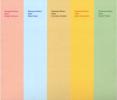 The "Plays" project came out over the course of 2001 on Bottrop-Boy(two 7" singles) and Staubgold (three mini-LPs). Each release in theseries consisted of two tracks. This CD is a handy way to get them allat once, and perhaps to understand the project more coherently. Whilethere's little information in the insert for those of us who can't readGerman, it's not hard to guess, given Ehlers's past form—particularlyhis membership of the defunct high-concept Mille Plateaux actAutopoieses—that there'll be some thinking behind it.
The "Plays" project came out over the course of 2001 on Bottrop-Boy(two 7" singles) and Staubgold (three mini-LPs). Each release in theseries consisted of two tracks. This CD is a handy way to get them allat once, and perhaps to understand the project more coherently. Whilethere's little information in the insert for those of us who can't readGerman, it's not hard to guess, given Ehlers's past form—particularlyhis membership of the defunct high-concept Mille Plateaux actAutopoieses—that there'll be some thinking behind it. After 1997's unimaginatively entitled third album, Download planned onreleasing two EPs ('Moth' and 'Resilient' if memory serves) that nevercame to be. More than likely some if not all of the material for thosehas resurfaced here, along with 'Effector' outtakes, on the thirdinstallment of the "From the Vault" series. From the get go I'mimpressed as these are finished tracks on par with or better than thosethat made the official releases, unlike the lifeless doodlings of thefirst Vault disc "Inception". "Sticky Glandstin" has all theessentials: a jittery bass heavy beat, bizarre samples and sounds andan amniotic atmosphere smeared across the stereo field. The next track"Dakota" is the first jaw dropper when it shifts gears and glides intoan elegant synthetic wash. Rhythmically "The Itch of Trepanning"swaggers and "Manmade" assaults while "Nor" caresses (it too dissolvinginto a howl enhanced ambient bliss midway through). "Walking, Talking"also beats you pleasantly senseless with an intricate mesh of metallicpercussion and electronic squelches over a groovy bass lead. "D.O.G."and "P.U.P." reference Key's longtime feline companions to which this45 minute collection is dedicated. With that in mind both take on asomewhat somber but thankful air, the rhythms tamed down some to focusmore on melodic feel. If you're remotely a fan of post-'The Eyes ofStanley Pain' Download, 'III Steps Forward' is very worth your while.
After 1997's unimaginatively entitled third album, Download planned onreleasing two EPs ('Moth' and 'Resilient' if memory serves) that nevercame to be. More than likely some if not all of the material for thosehas resurfaced here, along with 'Effector' outtakes, on the thirdinstallment of the "From the Vault" series. From the get go I'mimpressed as these are finished tracks on par with or better than thosethat made the official releases, unlike the lifeless doodlings of thefirst Vault disc "Inception". "Sticky Glandstin" has all theessentials: a jittery bass heavy beat, bizarre samples and sounds andan amniotic atmosphere smeared across the stereo field. The next track"Dakota" is the first jaw dropper when it shifts gears and glides intoan elegant synthetic wash. Rhythmically "The Itch of Trepanning"swaggers and "Manmade" assaults while "Nor" caresses (it too dissolvinginto a howl enhanced ambient bliss midway through). "Walking, Talking"also beats you pleasantly senseless with an intricate mesh of metallicpercussion and electronic squelches over a groovy bass lead. "D.O.G."and "P.U.P." reference Key's longtime feline companions to which this45 minute collection is dedicated. With that in mind both take on asomewhat somber but thankful air, the rhythms tamed down some to focusmore on melodic feel. If you're remotely a fan of post-'The Eyes ofStanley Pain' Download, 'III Steps Forward' is very worth your while.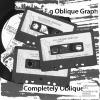 Prior to one hundred and forty-some (and counting) releases asMuslimgauze, Bryn Jones was known as E.g Oblique Graph. This limitededition set of 201 collects all of the tracks from the very rarecassette and vinyl releases: 1982's 'Extended Play', 'Piano Room' and'Triptych' and 1983's 'Inhalt'. What's on these two black CD-Rs bearslittle to no resemblance to trademark Muslimgauze. It's rather sparseand primal electronic music with a DIY attitude typical of the late'70s and early '80s. Jones plunked about and droned on synths, mixed invarious tape recordings and some pseudo-beats and lets it all churnwithin effects. The more dark or abstract the more interesting: marredchoirs and speech, reversed and otherwise manipulated tapes, electricdischarges, sonar-like pings, seemingly random juxtapositions, etc."Human Rights" is probably the first track (in title, at least) toaddress a socio-political concern while the final (and my favorite)track of disc one, the 20 plus minute "Piano Room", seems to be thefirst to utilize a drum machine amongst its varied movements. Israel's1982 invasion of Lebanon brought about a paradigm shift in Jones'inspiration, as evidenced by the titles of the two tracks that made upthe "Inhalt" cassette: "Islamic Koran In Camera Dome" and "Rapid WhiteFlag In Snapshot Blur". The blood is beginning to boil in the former asan upfront rhythm dominates most of the nearly nine minutes. Soon afterthis began Muslimgauze. 'Completely Oblique' isn't all that excitingreally, more of a historical footnote for Muslimgauze collectors.Though I do have a soft spot for this sort of amateur music making,having done it myself for a few years, I don't even listen to my owntapes anymore. The liner notes make it pretty clear that Jones wasn'ttoo interested in revisiting this or other past work either. So whileI'm grateful for the chance to finally hear it, I also have to wonderif re-issuing it was the right thing to do.
Prior to one hundred and forty-some (and counting) releases asMuslimgauze, Bryn Jones was known as E.g Oblique Graph. This limitededition set of 201 collects all of the tracks from the very rarecassette and vinyl releases: 1982's 'Extended Play', 'Piano Room' and'Triptych' and 1983's 'Inhalt'. What's on these two black CD-Rs bearslittle to no resemblance to trademark Muslimgauze. It's rather sparseand primal electronic music with a DIY attitude typical of the late'70s and early '80s. Jones plunked about and droned on synths, mixed invarious tape recordings and some pseudo-beats and lets it all churnwithin effects. The more dark or abstract the more interesting: marredchoirs and speech, reversed and otherwise manipulated tapes, electricdischarges, sonar-like pings, seemingly random juxtapositions, etc."Human Rights" is probably the first track (in title, at least) toaddress a socio-political concern while the final (and my favorite)track of disc one, the 20 plus minute "Piano Room", seems to be thefirst to utilize a drum machine amongst its varied movements. Israel's1982 invasion of Lebanon brought about a paradigm shift in Jones'inspiration, as evidenced by the titles of the two tracks that made upthe "Inhalt" cassette: "Islamic Koran In Camera Dome" and "Rapid WhiteFlag In Snapshot Blur". The blood is beginning to boil in the former asan upfront rhythm dominates most of the nearly nine minutes. Soon afterthis began Muslimgauze. 'Completely Oblique' isn't all that excitingreally, more of a historical footnote for Muslimgauze collectors.Though I do have a soft spot for this sort of amateur music making,having done it myself for a few years, I don't even listen to my owntapes anymore. The liner notes make it pretty clear that Jones wasn'ttoo interested in revisiting this or other past work either. So whileI'm grateful for the chance to finally hear it, I also have to wonderif re-issuing it was the right thing to do.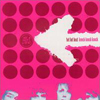 The music industry, like most industries built on commerce, tends tomove in cyclic patterns known to many as "trends." These "trends" aredisturbing only in the fact that they tend to rob the consumer of anyclear original thought. "Here, America! That other album by that otherband on that other label was good, huh? Well now, we, a completelydifferent label, bring you an artist that's pretty similar! What do youthink?" After the huge success of the Strokes and other bands with aretro-but-not-really sound, the race was on to find the next band withthe sound of yestermorrow. Here they are, from Sub Pop, Hot Hot Heat!After a single on Sub Pop and a whole album on Ohev, "Knock KnockKnock" is a five song EP to whet the listener's appetite for theeventual full-length on Sub Pop. And, yes, Hot Hot Heat have a soundthat is easily derivative, recalls other eras of musical, and stilltries to sound original and new. It doesn't. Their sound is supposedlysupposed to combine the best elements of the most popular music fromthe past three decades. And Hot Hot Heat does that pretty well.Unfortunately, it's not all that interesting to listen to. The firsttrack, 'Le Le Low', features a thumping bassline, Power Station-likedrums, and vocals that sound like the bastard child of Iggy Pop andDanny Elfman singing "where's all your passion gone?/where's all yourfashion gone?" Together, it all sounds like a new wave band that wokeup twenty years later to be produced by Bob Rock. And "Knock KnockKnock" never really does anything more than that. In this race to findthe next band that will bring relevance to past decades with music oftoday, Hot Hot Heat and Sub Pop are behind the leader by some distance,and it's unclear whether they'll be able to catch up.
The music industry, like most industries built on commerce, tends tomove in cyclic patterns known to many as "trends." These "trends" aredisturbing only in the fact that they tend to rob the consumer of anyclear original thought. "Here, America! That other album by that otherband on that other label was good, huh? Well now, we, a completelydifferent label, bring you an artist that's pretty similar! What do youthink?" After the huge success of the Strokes and other bands with aretro-but-not-really sound, the race was on to find the next band withthe sound of yestermorrow. Here they are, from Sub Pop, Hot Hot Heat!After a single on Sub Pop and a whole album on Ohev, "Knock KnockKnock" is a five song EP to whet the listener's appetite for theeventual full-length on Sub Pop. And, yes, Hot Hot Heat have a soundthat is easily derivative, recalls other eras of musical, and stilltries to sound original and new. It doesn't. Their sound is supposedlysupposed to combine the best elements of the most popular music fromthe past three decades. And Hot Hot Heat does that pretty well.Unfortunately, it's not all that interesting to listen to. The firsttrack, 'Le Le Low', features a thumping bassline, Power Station-likedrums, and vocals that sound like the bastard child of Iggy Pop andDanny Elfman singing "where's all your passion gone?/where's all yourfashion gone?" Together, it all sounds like a new wave band that wokeup twenty years later to be produced by Bob Rock. And "Knock KnockKnock" never really does anything more than that. In this race to findthe next band that will bring relevance to past decades with music oftoday, Hot Hot Heat and Sub Pop are behind the leader by some distance,and it's unclear whether they'll be able to catch up.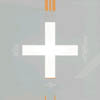 For years, singer/songwriter/New Yorker James Balyut has fronted thegroup Versus, cranking out a parade of critically-acclaimed rocking poprecords. With this self-titled long-paying debut album, Balyut hasstepped out, almost entirely alone, into the playing field of thisdecade, merging crafty tunemanship with a heap of drum machines,electronics, and a super clean production that's only ever slightlyrough around the edges. When it's good, it can get really, reallyawesome, with feverishly catchy tunes like "The Queen of Detroit," andthe slow but undeniably forceful, "The Declaration of Independence,"and somewhat sexily messy bursts in "All I Have to Do is Make You."Balyut's acoustic fingerpicking skills are highlighted in numeroussongs, including "The Industrial Revolution," a tune to bring a smileto nearly any David Grubbs fan with a vocal style that has most likelygiven people like Sam Prekop and Marcus Acher more confidence to singwith their timid voices. However, some of the slower moments, like thealbum's opening and the cringeful repetition of "Yo Yo Yo," can be moreembarassing than listening to Pet Shop Boys at loud volumes in public.When a four-piece group is assembled for live shows, the format istranslated almost entirely over to standard rock instrumentation, andthere's never a weak moment. Hopefully with future records, Balyut willbe less wary of letting his teeth show, but for now, this rather quietand laid-back record is more of a bold statement and could easily bodewell with fans of the more electronic side of Clinic who ache for a lotmore musical proficiency and no irony.
For years, singer/songwriter/New Yorker James Balyut has fronted thegroup Versus, cranking out a parade of critically-acclaimed rocking poprecords. With this self-titled long-paying debut album, Balyut hasstepped out, almost entirely alone, into the playing field of thisdecade, merging crafty tunemanship with a heap of drum machines,electronics, and a super clean production that's only ever slightlyrough around the edges. When it's good, it can get really, reallyawesome, with feverishly catchy tunes like "The Queen of Detroit," andthe slow but undeniably forceful, "The Declaration of Independence,"and somewhat sexily messy bursts in "All I Have to Do is Make You."Balyut's acoustic fingerpicking skills are highlighted in numeroussongs, including "The Industrial Revolution," a tune to bring a smileto nearly any David Grubbs fan with a vocal style that has most likelygiven people like Sam Prekop and Marcus Acher more confidence to singwith their timid voices. However, some of the slower moments, like thealbum's opening and the cringeful repetition of "Yo Yo Yo," can be moreembarassing than listening to Pet Shop Boys at loud volumes in public.When a four-piece group is assembled for live shows, the format istranslated almost entirely over to standard rock instrumentation, andthere's never a weak moment. Hopefully with future records, Balyut willbe less wary of letting his teeth show, but for now, this rather quietand laid-back record is more of a bold statement and could easily bodewell with fans of the more electronic side of Clinic who ache for a lotmore musical proficiency and no irony. Whilst Manchester's regular quiet improv and odd experimental night ofrumbunctious shenanigans has gone into hibernation, its instigatorDaniel Weaver (Unplugboy) keeps the soundwaves coming with a typicallycuriously presented double 3" CD. About a year back, Daniel took hiscello input laptop on a trip around various British arthouses anddives, accompanying the drones, judders and high squeals of Japanesemaestro of the no-input mixing desk, Toshimaru Nakamura. He's editeddown his performances to one of these little CDs, and all his duetswith Toshimaru Nakamura to the other one. By the time they reachedManchester, Daniel had dislodged the bridge from his cello and clippedcrocodile clips all over the strings. The two of them were makingalmost no sound at all, and such was their pursual of minimal quietude,that it seemed Toshi's shadow on the wall might've become audible. Itseems that some of the events in other cities rendered up some slightlynoisier material, judging by these two little discs snuggled in theirgrey latex-foam wallet. The Unplugboy disc opens with sounds thatresemble exerted panting breath, and soon a rhythmic door hinge squeakstarts up. Slowly groans and drones of a more recognisably cellicnature arch around. Despite moves towards atonal abstraction, therealways seems to be a rhythmic undertow, even if it's sometimes leftunstated. Usually there's some kinda oddlooping goin' on. Cauldronsbubble and mystic organic sci-fi machines sing their breakingglitch-song. Perhaps Unplugboy's closest companion in laptop / stringinterface invention would be Kaffe Mathews, with whom he's performed inthe past. Both have an interest in seeing just how far they can pushtheir mutant stringsounds without having to resort to high volumeonslaughts. Second track "Newcastle" slowly builds an eerie feel of anasthmatic witches coven summoning down elementals in an operatingtheatre. The "Chinese" helping of Unplugboy's collaboration withToshimaru Nakamura is marked by much denser blocks of sound and highfeedback squeals, under which the cellaptop makes little rumbles like atoy car in trouble. Imagine a life support machine for a being thatbreathes white noise and sine waves, exhaling them as regular sfericpatterns that soon dissolve. The longest portion is "Indian" and openswith squeaker mousey jangles over mindfuck midrange drone-nasties. Thisis where they reach meltdown and the mice run screaming in circles fromthe mouse organ as it catches fire. The emergency klaxons peal thenbreakdown as the monitors smoke. Finally fractured dyslexic morse codeblips into oblivion. The three inch CD format is perhaps in generalunderused and works very well here, leaving me wanting to hear more,and unfortunately the short sound files do a disservice to evolvingsoundscapes that should be heard in their entirety.
Whilst Manchester's regular quiet improv and odd experimental night ofrumbunctious shenanigans has gone into hibernation, its instigatorDaniel Weaver (Unplugboy) keeps the soundwaves coming with a typicallycuriously presented double 3" CD. About a year back, Daniel took hiscello input laptop on a trip around various British arthouses anddives, accompanying the drones, judders and high squeals of Japanesemaestro of the no-input mixing desk, Toshimaru Nakamura. He's editeddown his performances to one of these little CDs, and all his duetswith Toshimaru Nakamura to the other one. By the time they reachedManchester, Daniel had dislodged the bridge from his cello and clippedcrocodile clips all over the strings. The two of them were makingalmost no sound at all, and such was their pursual of minimal quietude,that it seemed Toshi's shadow on the wall might've become audible. Itseems that some of the events in other cities rendered up some slightlynoisier material, judging by these two little discs snuggled in theirgrey latex-foam wallet. The Unplugboy disc opens with sounds thatresemble exerted panting breath, and soon a rhythmic door hinge squeakstarts up. Slowly groans and drones of a more recognisably cellicnature arch around. Despite moves towards atonal abstraction, therealways seems to be a rhythmic undertow, even if it's sometimes leftunstated. Usually there's some kinda oddlooping goin' on. Cauldronsbubble and mystic organic sci-fi machines sing their breakingglitch-song. Perhaps Unplugboy's closest companion in laptop / stringinterface invention would be Kaffe Mathews, with whom he's performed inthe past. Both have an interest in seeing just how far they can pushtheir mutant stringsounds without having to resort to high volumeonslaughts. Second track "Newcastle" slowly builds an eerie feel of anasthmatic witches coven summoning down elementals in an operatingtheatre. The "Chinese" helping of Unplugboy's collaboration withToshimaru Nakamura is marked by much denser blocks of sound and highfeedback squeals, under which the cellaptop makes little rumbles like atoy car in trouble. Imagine a life support machine for a being thatbreathes white noise and sine waves, exhaling them as regular sfericpatterns that soon dissolve. The longest portion is "Indian" and openswith squeaker mousey jangles over mindfuck midrange drone-nasties. Thisis where they reach meltdown and the mice run screaming in circles fromthe mouse organ as it catches fire. The emergency klaxons peal thenbreakdown as the monitors smoke. Finally fractured dyslexic morse codeblips into oblivion. The three inch CD format is perhaps in generalunderused and works very well here, leaving me wanting to hear more,and unfortunately the short sound files do a disservice to evolvingsoundscapes that should be heard in their entirety.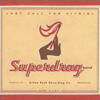 I still miss the Superdrag of old, but this incarnation gets better allthe time. Last time we left our indie rock heroes, they put out a splitsingle with the Anniversary that sort of redeemed the close to awfultour CD "Greetings from Tennessee." Their new album, Superdrag's secondfull-length for Arena Rock, opens with the first track from that EP,'Baby Goes to Eleven.' Re-recorded, it sounds a hundred percent better,with Bob Pollard on backing vocals. A good start, though not as strongas the last album. After that, there is a track written and sung bybassist Sam Powers. This is why I miss the Superdrag of old. I like Samenough, and his songs are good, but they'd be so much better off topool their efforts. Namely, let John Davis do the singing, Sam. Thestrongest moments on this release are the songs that Davis pens andsings. After that comes the tracks co-written by all members save MicHarrison, who I don't think has been in the band long enough tocontribute. After that are Sam's songs. His second on the album, whichhe also sings, was also on "Greetings...", and it was pretty bad. It'sbetter now, but not as strong a song in the Superdrag catalog. Will'Stu' stack up against 'Sucked Out', 'Destination Ursa Major','Hellbent', 'Annetichrist', or 'Keep It Close to Me'? Nope. But 'TheStaggering Genius' will. And 'Feeling Like I Do' is easily the bestSuperdrag song ever,with the most honest lyrics I feel Davis has ever uttered: "I just wantyou twisted with me, too/yeah yeah/I don't know what I've been tryin'to prove/yeah yeah/everytime I get too fucked to move." Honestly, lowmoments a side, this is the best Superdrag have sounded in years, andhere's to hoping it keeps getting better.
I still miss the Superdrag of old, but this incarnation gets better allthe time. Last time we left our indie rock heroes, they put out a splitsingle with the Anniversary that sort of redeemed the close to awfultour CD "Greetings from Tennessee." Their new album, Superdrag's secondfull-length for Arena Rock, opens with the first track from that EP,'Baby Goes to Eleven.' Re-recorded, it sounds a hundred percent better,with Bob Pollard on backing vocals. A good start, though not as strongas the last album. After that, there is a track written and sung bybassist Sam Powers. This is why I miss the Superdrag of old. I like Samenough, and his songs are good, but they'd be so much better off topool their efforts. Namely, let John Davis do the singing, Sam. Thestrongest moments on this release are the songs that Davis pens andsings. After that comes the tracks co-written by all members save MicHarrison, who I don't think has been in the band long enough tocontribute. After that are Sam's songs. His second on the album, whichhe also sings, was also on "Greetings...", and it was pretty bad. It'sbetter now, but not as strong a song in the Superdrag catalog. Will'Stu' stack up against 'Sucked Out', 'Destination Ursa Major','Hellbent', 'Annetichrist', or 'Keep It Close to Me'? Nope. But 'TheStaggering Genius' will. And 'Feeling Like I Do' is easily the bestSuperdrag song ever,with the most honest lyrics I feel Davis has ever uttered: "I just wantyou twisted with me, too/yeah yeah/I don't know what I've been tryin'to prove/yeah yeah/everytime I get too fucked to move." Honestly, lowmoments a side, this is the best Superdrag have sounded in years, andhere's to hoping it keeps getting better. 'WeAre Eyes, We Are Builders' was released last year on Ronnie Martin ofJoy Electric's Plastiq Musiq label, but apparently Soviet have splitwith Plastiq and rereleased the album on Mogul Electro, which wasresponsible for the Electroclash comp (and NYC festival) of last fall.An interesting move; I wonder if it was Plastiq's poor distributionthat made them jump ship. I've been really digging Soviet since lastyear when I unexpectedly caught them live in New York, just as thewhole "electroclash" scene was picking up momentum, and I've beenlistening to the Plastiq version of this CD for months. What makes themstand out to me from most of the other electroclash stuff is the lackof pretention and posturing in their presence and the absence of angstand innuendo in the music. This probably has a lot to do with roots -unlike a lot of the electroclash bands, Soviet didn't come from thedowntown scene; instead, the downtown scene found Soviet and embracedthem. Soviet's songs are wholly influenced by the synth-driven 1980s,but instead of being specifically influenced by a particular group orgenre, Soviet takes the best of the early-to-mid '80s as a whole; thefact that nearly every song on the album sounds like a hit single is atestament to the group's pop songwriting abilities, particularly ofsinger Keith Ruggiero and synth player Chris Otchy. The music is almostearnest in melody and lyrics, and Ruggerio obviously knows his wayvocally around a song. Probably there is a bit of irony in the musicand lyrics, but if it is, it's buried somewhere hard to find, andsuprisingly, this lack of irony make the music even more likable. Therecording quality is great, too - though obviously fully digital, thesynth and drum machines are warm and full; this CD sounds excellentwhen played loud through a good stereo. This rerelease of the albumreplaces two tracks from the Plastiq version with two newerinstrumentals, and the track listing has been completely reordered(though not necessarily for the better Ð "China," the original opener,was a superb beginning for this album, and now it's been delegated tothe 10th spot out of 12). The songs have been also been remixed, andthe most notable change is the addition of Kenan Gunduz's guitar on anumber of tracks. In essence, this is probably a smart move, as itbetter reflects Soviet's live show, but to someone like me who's prettyfamiliar with the original release, some of the guitar seems tacked on.But perhaps I'm just not used to it, and a fresh listener might notdetect anything weird. Regardless, I think this album is leagues aheadof the rest of the electroclash pack. When compared with most of theirpeers, Soviet's songs are more skillfully written and recorded, andthey better reflect their influences without falling into territorythat's too derivative. If you like any of the more popular electroclashoutfits,ÊI highly recommend checking out this CD, though I might stillharbor a preference for the original Plastiq Musiq version.
'WeAre Eyes, We Are Builders' was released last year on Ronnie Martin ofJoy Electric's Plastiq Musiq label, but apparently Soviet have splitwith Plastiq and rereleased the album on Mogul Electro, which wasresponsible for the Electroclash comp (and NYC festival) of last fall.An interesting move; I wonder if it was Plastiq's poor distributionthat made them jump ship. I've been really digging Soviet since lastyear when I unexpectedly caught them live in New York, just as thewhole "electroclash" scene was picking up momentum, and I've beenlistening to the Plastiq version of this CD for months. What makes themstand out to me from most of the other electroclash stuff is the lackof pretention and posturing in their presence and the absence of angstand innuendo in the music. This probably has a lot to do with roots -unlike a lot of the electroclash bands, Soviet didn't come from thedowntown scene; instead, the downtown scene found Soviet and embracedthem. Soviet's songs are wholly influenced by the synth-driven 1980s,but instead of being specifically influenced by a particular group orgenre, Soviet takes the best of the early-to-mid '80s as a whole; thefact that nearly every song on the album sounds like a hit single is atestament to the group's pop songwriting abilities, particularly ofsinger Keith Ruggiero and synth player Chris Otchy. The music is almostearnest in melody and lyrics, and Ruggerio obviously knows his wayvocally around a song. Probably there is a bit of irony in the musicand lyrics, but if it is, it's buried somewhere hard to find, andsuprisingly, this lack of irony make the music even more likable. Therecording quality is great, too - though obviously fully digital, thesynth and drum machines are warm and full; this CD sounds excellentwhen played loud through a good stereo. This rerelease of the albumreplaces two tracks from the Plastiq version with two newerinstrumentals, and the track listing has been completely reordered(though not necessarily for the better Ð "China," the original opener,was a superb beginning for this album, and now it's been delegated tothe 10th spot out of 12). The songs have been also been remixed, andthe most notable change is the addition of Kenan Gunduz's guitar on anumber of tracks. In essence, this is probably a smart move, as itbetter reflects Soviet's live show, but to someone like me who's prettyfamiliar with the original release, some of the guitar seems tacked on.But perhaps I'm just not used to it, and a fresh listener might notdetect anything weird. Regardless, I think this album is leagues aheadof the rest of the electroclash pack. When compared with most of theirpeers, Soviet's songs are more skillfully written and recorded, andthey better reflect their influences without falling into territorythat's too derivative. If you like any of the more popular electroclashoutfits,ÊI highly recommend checking out this CD, though I might stillharbor a preference for the original Plastiq Musiq version.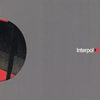 Okay, I'll be the first to say it: I just don't see it. Once again, aband has emerged from New York City making a huge name for themselvesin magazines, getting signed to Matador, getting compared to JoyDivision and other classic bands, and I just don't see it. At all. ThisEP is horrible.This band is horrible. There's nothing redeeming about sounding likeother bands, but these guys don't even sound like any of the bandsthey're compared to, so if they're throwing them out as influencesthat's a mistake on their part. This music is unoriginal,unimaginative, meandering, melancholy nonsense. When I saw the mentionin Entertainment Weekly recently, I should have known the game was up.But no. I gave them a chance. I opened my mind and ears to Interpol.And I'm not impressed/amused/amazed/excited or otherwise enthused. It'sjust bad. And not in that "it's just bad enough to be good" way,either. 'PDA' opens with a hard drum beat, and vocals that are mutedand washed out that sound like they're being sung by a Germanexpatriate. The melody is tired but has promise, and then the choruswith its "sleep tight/sleep tonight" is trite. It reminded me of one ofthe songs Darryl Zero sings. Then it's time for 'NYC'. Side note: ifone more band from NYC has a song with NYC in the title, I'm going tostart taking pills. It's slow tempo, it has silly lyrics ("the subwayshe is a porno/and the pavements they are a mess"), and it's just shyof a Mogwai melody with nowhere to go. And just when that one's over,'Specialist' starts and it seems, for a moment, like it might restoreyour faith. That bassline is catchy enough if the song would rock outand work hard for it's money. But then the vocals start. And they'reoff a little with the bassline because the guitars haven't come in yet.Then the song doesn't rock. It doesn't roll. It does nothingbut stink. A lot. A word to journalists: stop comparing this band toJoy Division. It's a disgrace to that band, and a mischaracterizationfor this one. And a word to the listener: if you liked this release, Ihave three words for you - Shudder to Think. They did this so muchbetter six years ago, and even then it was questionable. Avoid. Avoid,avoid, avoid this band.
Okay, I'll be the first to say it: I just don't see it. Once again, aband has emerged from New York City making a huge name for themselvesin magazines, getting signed to Matador, getting compared to JoyDivision and other classic bands, and I just don't see it. At all. ThisEP is horrible.This band is horrible. There's nothing redeeming about sounding likeother bands, but these guys don't even sound like any of the bandsthey're compared to, so if they're throwing them out as influencesthat's a mistake on their part. This music is unoriginal,unimaginative, meandering, melancholy nonsense. When I saw the mentionin Entertainment Weekly recently, I should have known the game was up.But no. I gave them a chance. I opened my mind and ears to Interpol.And I'm not impressed/amused/amazed/excited or otherwise enthused. It'sjust bad. And not in that "it's just bad enough to be good" way,either. 'PDA' opens with a hard drum beat, and vocals that are mutedand washed out that sound like they're being sung by a Germanexpatriate. The melody is tired but has promise, and then the choruswith its "sleep tight/sleep tonight" is trite. It reminded me of one ofthe songs Darryl Zero sings. Then it's time for 'NYC'. Side note: ifone more band from NYC has a song with NYC in the title, I'm going tostart taking pills. It's slow tempo, it has silly lyrics ("the subwayshe is a porno/and the pavements they are a mess"), and it's just shyof a Mogwai melody with nowhere to go. And just when that one's over,'Specialist' starts and it seems, for a moment, like it might restoreyour faith. That bassline is catchy enough if the song would rock outand work hard for it's money. But then the vocals start. And they'reoff a little with the bassline because the guitars haven't come in yet.Then the song doesn't rock. It doesn't roll. It does nothingbut stink. A lot. A word to journalists: stop comparing this band toJoy Division. It's a disgrace to that band, and a mischaracterizationfor this one. And a word to the listener: if you liked this release, Ihave three words for you - Shudder to Think. They did this so muchbetter six years ago, and even then it was questionable. Avoid. Avoid,avoid, avoid this band.
